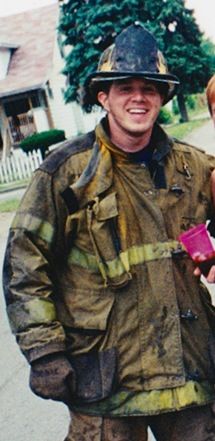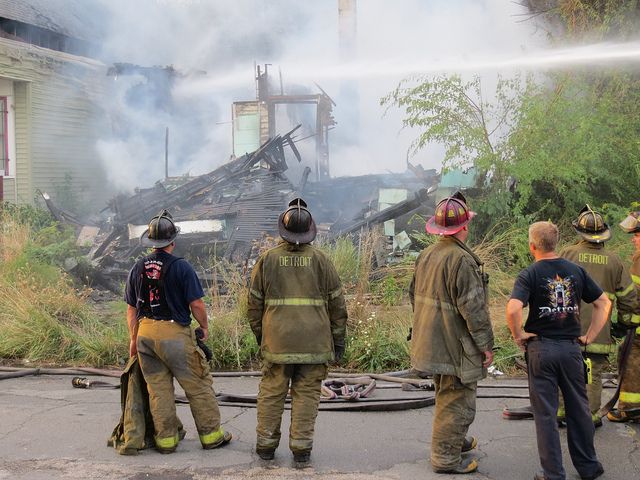In February 2007, Walt Grysko was barreling through the streets of Detroit en route to a fire when his firetruck was t-boned by a car exceeding 70 miles per hour. The crash sent Grysko through the windshield and hurled him 60 feet away, breaking his back in five places. The firetruck’s driver, 47-year-old Joe Torkos, died. Grysko, now 57, retired in 2008 on doctor’s orders after serving the Motor City for 25 years.
This summer, Detroit fire and police department retirees received notice that their benefits would be cut at the end of the year and that they would be given a small monthly stipend, ranging from $125 to $200, to find their own health care. The end date has since been extended to February 28, 2014. (Disclosure: My grandmother, who gets benefits through the fire department from my grandfather’s 31 years as a Detroit firefighter, received the same letter.)
Fellow Detroit firefighter Brendan Milewski was hit with a chunk of limestone when a building his crew was tending to collapsed in August 2010. The blow left him paralyzed. Now, at age 34, he’s not sure what he’ll do when March 1 rolls around. And he doesn’t yet know how much of his $2,800 monthly pension, including disability, he’ll retain as the city goes into bankruptcy court.
“We’ve heard speculation of 16 cents on the dollar,” he told me. “We have no idea.”
From California to Chicago, pension reform is on the way. But in Detroit, a city protected by Chapter 9 bankruptcy, pensioners are just another debt in court, which leaves them in a precarious position. Those debts aren’t predatory bankers from Wall Street. They’re folks who have served the city and, in the case of Grysko and Milewski, were injured in the line of duty. There’s a very good chance that their pensions could be drastically impaired in bankruptcy court, something that the Michigan constitution would protect if the city were financially healthy.

Brendan Milewski during his days as a Detroit firefighter. Credit: Nicola Marsh
Detroit-area bankruptcy lawyer Doug Bernstein called it a game of wait-and-see. “The truth is, none of us know what’s going to happen,” he said. “So they’re at risk, and the range of possibilities goes from nothing happens to them — which is highly unlikely — to an impairment, but who knows of what magnitude.”
Concessions, as Bernstein suggests, will have to be made. The city carries $18 billion in long-term debt. It’s easy for the media and bankruptcy lawyers to forget that these decisions, though tough and necessary, have a serious, life-altering impact outside the walls of a courtroom. The ledger needs to be reset, but many families will take the blow.
The terrifying part for Detroit’s retired firefighters and police officers is that they’re worse off when they hit 65. That’s because they did not pay into social security due to the way their pension plans were negotiated. The pension is all they have.
“If we were still working and there was a change to the pension, we could adjust to that. But we’re out of the game now,” Grysko said. “We’re unemployable and stuck with what we have, and then they want to cut what we have. It seems grossly unfair to me.”
Something has to give. And, as the pensioners feared when Detroit Emergency Manager Kevyn Orr filed for bankruptcy in July, they could lose chunks of their pension because of it. Pensioners argue that they’ve held up their end of the deal, but bankruptcy law says otherwise. Empathy and financial reality are on a collision course.
Retirees, however, remain resilient about their position.
“We’re the real citizen soldiers here,” Grysko said. “We put ourselves in harm’s way to protect the citizens in the communities that we served. I believe guys like myself and fellow firefighters in wheelchairs and in bad shape, the widows and orphans of guys who have died in the line of duty — we’ve given our share. And I really don’t think it’s right for them to hit us like this. It can greatly affect the quality of life that we have left. Not only for ourselves, but our families.”
The Equity Factor is made possible with the support of the Surdna Foundation.

Bill Bradley is a writer and reporter living in Brooklyn. His work has appeared in Deadspin, GQ, and Vanity Fair, among others.





_600_350_80_s_c1.JPEG)











